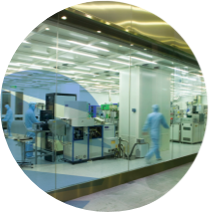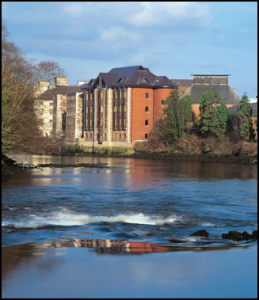UCC-Tyndall
TA80 – UCC-TYN
Location
Lee Maltings, Dyke Parade
T12R5CP Cork, Ireland

Description
The infrastructure provides access to facilities for materials, device and system integration experiments pertaining to long battery life WSN (wireless sensor network) modules and systems for Renewable Energy Systems (RES) applications for "ICT enabled" Condition Monitoring (CM) and Energy Efficiency Management (EEM). Additionally, nano and micro materials and structures, materials and device processing, as well as full Si CMOS, MEMS wafer semiconductor fabrication facilities, the development of battery life/energy simulation tools and novel processing for "More than Moore" offerings serves for miniaturisation and integration.
It provides "ICT enabling" access services:
- At system level: Tools and expertise to optimise WSN modules for RES CM and EEM. This can be applied to RES generation and storage as well as inter-operability with equipment on the load (demand) side.
- At device level: Advanced characterisation and prototype assessment of micro-power energy harvesting, storage and power management materials and devices , as well as the development of smart materials, devices, test structures and simulation tools and on-site deployment testbed to do real-life experiments.
Testing Capabilities
Identify ICT enabling tech platforms, promote and exemplify usage across multiple cross-cutting RES fields (e.g., Photovoltaic (PV), wind, wave).
Leverage value proposition of retrofitting WSN devices on, in or near equipment and infrastructure bringing the following benefits:
- Condition and energy efficiency monitoring of equipment
- Interoperability for Energy demand management (EDM), Smart Energy Systems (SES), Demand Energy Response (DER), Energy Efficiency in Building (EEB) optimisation, etc.
It can be done temporarily or permanently at development, deployment or operation phases of RES and components.
Impediment: WSN devices need significantly longer battery life than is commercially available for them to deployed at large scale.
Solution: Better batteries, micro-power energy harvesting and WSN device collaborative eco-design amongst stakeholders based on the real-life sensing and data processing requirements.
This requires a combination of better batteries, micropower energy harvesting as well as WSN device collaborative eco-design amongst stakeholders based on the real-life sensing and data processing requirements as well as exploiting the ambient energies available.
As such, a major portion of the effort will be dedicated to development of Autonomous/Long battery life solutions (micro-power energy harvesting, power management), for example miniaturised PV panels to self-power the WSN nodes.
Planned services on offer:
- At system level: Tools and expertise to optimise WSN modules for RES CM and EEM. This can be applied to RES generation and storage as well as inter-operability with equipment on the load (demand) side.
- At device level: Advanced characterisation and prototype assessment of micro-power energy harvesting, storage and power management materials and devices while also supporting the development of smart materials, devices, test structures and simulation tools and on-site deployment testbed to do real-life experiments.
Technical Equipment
- Laboratories for testing and characterising WSN modules and their power sources (Power analysers, digital programmable loads, oscilloscopes, impedance analysers, WSN module testbeds)
- Potential access to small scale RES equipment via parent university UCC
- Development of battery life/energy simulation tools
- Full Si CMOS, MEMS Wafer Semiconductor fabrication facilities
- Novel processing for ‘More than Moore’ offerings serves for miniaturisation and integration
Additional information
Technology Readiness Level: 4-6
Special considerations: The value proposition here is ICT, namely that WSN modules can be retrofitted on, in or near RES equipment and infrastructure, at any stage in its lifecycle from development to operation and maintenance. In addition to being able to do laboratory-based experiments, local access to small scale renewable energy equipment on site is possible (e.g., PV panels) and/or at the parent university UCC (e.g., wind, tidal, wave energy). Most of the expertise involves the use of micro-power energy harvesting to self-power the WSN modules.
Technology clusters: Others
Website: http://www.tyndall.ie
Availability: September 2024 - Sept 2026
Provision of tools to prepare data sets in a FAIR way: Yes


